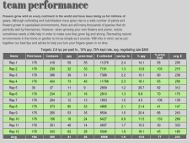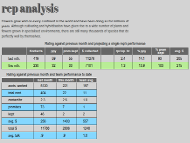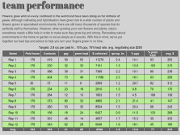- home
- writing samples
- photos
- spreadsheets
Spreadsheets

The team performance spreadsheet charts the performance to date of a call center team over a wide variety of performance parameters.Read more...

The rep analysis spreadsheet compares a rep's performance to the previous month and the team average.Read more...
- web interests
Some of my favorite links
Staying abreast of technology

MIT's Technology Review's mission is to identify important new technologies—deciphering their practical impact and revealing how they will change our lives.Read more...

Lifehacker offers tips, tricks, and downloads for getting things done.Read more...
-
contact
writing samples...medicine
Florida Court Modifies Drug-free Workplace Statute
A construction worker has successfully challenged a ruling by a Florida compensation claims court denying him worker compensation benefits because he tested positive for marijuana. The decision by a Florida appeal court held illegal a provision in a 1993 statute that said positive drug test results for employees injured at a drug-free workplace automatically proved the employee’s intoxication caused the injury. Now, in Florida, injured workers who can show intoxication or drug use did not cause an accident, even in light of a positive test, may win compensation benefits.
Is The Law Toothless?
“If the ruling stands, an employee testing positive will have an opportunity to prove that there was no connection between drug use and the accident,” says Miami attorney Robert Teitler of Walton, Lantaff, Schroeder & Carson, who represented the company. The decision, Teitler says, “takes the teeth out of the drug-free workplace laws.”
The law provides a discount on worker compensation premiums to companies with drug-free workplace policies and was meant to preclude drug use in and out of the workplace, Teitler says. “The way the statute is drafted, if drugs are found [in the employee’s urine sample] he can’t rebut [the presumption that his intoxication caused the injury],” Teitler explains. He says the ruling takes away any incentive for employers to create a drug-free workplace because “drug-free” implies an absolute cutoff. The decision suggests it may be okay for an employee in the same situation to use drugs.
However, Gerry Wilson, a consultant on drug-free workplace policies with Employee ASSIST (a division of Family Alternatives Counseling & Treatment Inc.), disagrees with Teitler’s assessment. He says that most employers will not be affected by the case. “This ruling helps only those workers who can prove they did not cause the accident and will apply mostly to construction work, where objects can fall off a building and injure a worker.” Most workplace accidents involve a single worker doing a task he has done for several years, Wilson explains. When an accident occurs the worker can seldom successfully claim his drug use did not cause it. “The ruling [by the appeal court] probably has corrected something that should have been corrected before,” he says.
Keith Roberts of the Florida Chamber of Commerce is concerned. “Employers worked very hard to put language in the statute that says workers should refrain from reporting to work with drugs [in their system],” he says. The Chamber formed a task force to come up with a strategy to counter the ruling. “We recognize that the court’s decision may be progressive, but we feel all rights should be balanced with responsibilities,” Roberts says. “Workers should not jeopardize their -- and other workers’ -- safety.”
Examining the Facts
The employee’s attorney, Randy Ellison, a West Palm Beach attorney specializing in worker compensation law, says the court couldn’t rule any other way. “It is clear that the central fact of the case is that my client did not cause the injury,” he says. In the case, Recchi America Inc., a construction company, had a drug- and alcohol-free policy that required all employees to sign a statement agreeing to drug or alcohol testing if they suffered an injury. When Ellison’s client suffered a head injury after he was inadvertently hit with a steel bar, he took a urine test that came up positive for marijuana.
The worker admitted smoking marijuana five days earlier, but, according to the physician who stitched his wound, he appeared alert and responsive. The compensation claims judge agreed that the worker was probably not impaired at the time of the accident. But he concluded that the law intended to deny benefits to any employee who took drugs at a drug-free workplace and denied the claim.
The Florida appeals court held that since the employee’s use of marijuana did not cause the injury here, the law should allow him to rebut the statutory presumption of intoxication.
Quit Smoking by Phone
Quitting smoking is a difficult task for most confirmed puffers, who tend to relapse within two weeks. A study by the University of California’s Cancer Center shows that telephone counseling helps smokers stay smoke-free longer than do-it-yourself measures. Dr. Shu-Hong Zhu, a member of the research team, says employers’ most important deciding factor for including workers in a rehabilitation program is their level of readiness. “Your time is best spent with people who are prepared to quit,” he says.
Setting up Your Own Smoking Phone
Employers interested in the program can get help from the Cancer Center in setting up their own, says Dr. Zhu, who has set up a similar program in Boston. He recommends you start with professional counselors who should undergo a one month training program at the university. “Alternatively, the Cancer Center will send someone to train your staff in-house for one week,” he says. He also advises that employers: -- Use psychologists or professional counselors; -- Recruit employees who wish to quit by advertising a phone number for them to call; -- Include only those employees who are ready to quit that week; -- Reinforce the smoker’s motivation to change; -- Help the smoker develop effective coping strategies to overcome the urge to smoke; and -- Schedule follow-up sessions close together, particularly in the first two weeks.
Three Steps to Success
Dr. Zhu says your smoking hotline must have three distinct features to ensure success: -- Proactive counseling in which the counselors initiate all subsequent calls after the first call for help by the smoker; -- A structured program -- the counseling calls must be brief. On each call the counselor uses six different questionnaires. The first is focussed on motivating change in the smoker and the following five concentrate on preventing a relapse; and -- Counselors schedule follow-up sessions close together in the early stages, rather than at regular intervals. They should occur at 1, 3, 7, 14, and 30 days after the first session. Smokers are more likely to abstain if they know a counselor will be checking up on them.
Result are Encouraging
Telephone counseling produces the same results as face-to-face counseling, totaling a 30% success rate across the three groups of subjects studied by the University of California. Telephone counseling also has the advantages of convenience and less expense in terms of office space required. The university’s study of the program’s effectiveness split the subjects into three groups: self-help, single session and multiple sessions. Subjects in multiple counseling sessions were 25% more likely to abstain for one week than smokers in the self-help group, and nearly twice as likely to quit for 12 months. The study showed that the 12 month abstinence rates for quitters were: 7.2 percent for self-help, nine percent for single-sessions and 13.4 percent for multi-sessions. The study concludes that the single counseling group’s improvement over the self-help group indicates that a well-conducted counseling program can have a significant effect on behavior change.
SPREADSHEET DEVELOPMENT
Samples of my interest in performance analysis and training... FOLLOWLANDSCAPE PHOTOGRAPHY
Samples of my interest in landscape photography... FOLLOWAUTO PHOTOGRAPHY
Samples of my interest in automotive photography ... FOLLOWCONSTRUCTION PHOTOGRAPHY
Samples of my interest in construction photography... FOLLOWWEB DESIGN
Samples of my webpage designs... FOLLOWFormal Training
- Bsc. Business Administration
- HTML 3.2
- SAP FICO
- SAP BW/BI
Industry experience
- hotel management
- marketing management
- publishing/web design
- call center management
© May 2013 mmfDESIGNS
contact the webmaster if you have any questions or concerns
chief design officer: Mike McFarlane
mike mcfarlane's resume





